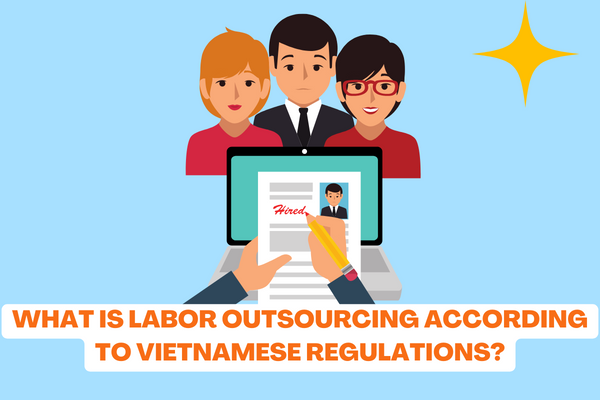Vietnam: What is labor outsourcing? What is the list of jobs that are leased under current regulations?
What is labor outsourcing in Vietnam?
Pursuant to Article 52 of the Labor Code 2019, the following provisions:
Article 52. Labor outsourcing
1. Labor outsourcing is an arrangement in which a worker enters into an employment contract with an outsourcing enterprise, which subsequently dispatches the worker to work for another employer (client enterprise) while maintaining labor relations with the outsourcing enterprise with which the employment contract is concluded.
2. Labor outsourcing is a conditional business, requires the labor outsourcing license and applies only to certain types of work.
According to the above provisions, labor outsourcing is the fact that an employee enters into a labor contract with an employer who is a labor outsourcing enterprise and the employer will transfer the employee to work and be under the management of another employer but still maintain labor relations with the lessor.

Vietnam: What is labor outsourcing? What is the list of jobs that are leased under current regulations?
What is the list of jobs that are currently outsourced in Vietnam?
Pursuant to Appendix II issued together with Decree 145/2020/ND-CP stipulating the current list of jobs to be leased as follows:
1. Interpretation/Translation/Shorthand.
2. Secretary/Administrative Assistant.
3. Reception.
4. Travel guide.
5. Sales support.
6. Project support.
7. Programming the production machine system.
8. Manufacturing and installing television and telecommunications equipment.
9. Operation/inspection/repair of construction machinery and production power systems.
10. Cleaning buildings and factories.
11. Document editing.
12. Bodyguard/Security Guard.
13. Marketing/Customer Care over the phone.
14. Handling financial and tax issues.
15. Repair/Inspection of automobile operation
16. Scanning, drawing industrial engineering/Interior decoration.
17. Drive.
18. Management, operation, maintenance and service on ships.
19. Management, supervision, operation, repair, maintenance and service on oil and gas drilling rigs.
20. Flying aircraft, serving on board/Maintaining and repairing aircraft and aircraft equipment/Dispatching, flying operations/Flight supervision.
Accordingly, the jobs that are outsourced to labor are now carried out according to the above-mentioned list.
What are the conditions for enterprises to operate labor outsourcing in Vietnam?
According to Article 54 of the Labor Code 2019, the following provisions:
Article 54. Outsourcing enterprises
1. An outsourcing enterprise shall pay a deposit and obtain labor outsourcing license.
2. The Government shall provide for the issuance of labor outsourcing licenses, making deposit, the types of work that allow dispatched labor.
Accordingly, an enterprise that wants to operate labor outsourcing must make a deposit and be granted a labor outsourcing license.
Pursuant to Article 21 of Decree 145/2020/ND-CP stipulates as follows:
Article 21. Contents of employment contracts
1. An employment contract shall have the following major contents:
a) The employer’s name, address; full name and position of the person who concludes the contract on the employer’s side;
b) Full name, date of birth, gender, residence, identity card number or passport number of the person who concludes the contract on the employee’s side;
c) The job and workplace;
d) Duration of the employment contract;
dd) Job- or position-based salary, form of salary payment, due date for payment of salary, allowances and other additional payments;
e) Regimes for promotion and pay rise;
g) Working hours, rest periods;
h) Personal protective equipment for the employee;
i) Social insurance, health insurance and unemployment insurance;
k) Basic training and advanced training, occupational skill development.
2. If the employees’ job is directly related to the business secret, technological know-how as prescribed by law, the employer has the rights to sign a written agreement with the employee on the content and duration of the protection of the business secret, technology know-how, and on the benefit and the compensation obligation in case of violation by the employee.
3. If the employee works in agriculture, forestry, fishery, or salt production, both parties may exclude some of the aforementioned contents and negotiate additional agreements on settlement in the case when the contract execution is affected by natural disaster, fire or weather.
4. The contents of the employment contract with an employee who is recruited to work as the director of a state-invested enterprise shall be stipulated by the Government.
5. The Minister of Labor, War Invalids and Social Affairs elaborate Clauses 1, 2 and 3 of this Article.
According to the above provisions, an enterprise doing labor outsourcing activities must deposit VND 2 billion and the legal representative of the enterprise must meet the above conditions, it will be eligible to grant a labor outsourcing operation license.
What principles must labor outsourcing activities ensure in Vietnam?
Pursuant to Article 53 of the Labor Code 2019, it provides as follows:
Article 53. Labor outsourcing rules
1. The maximum duration of labor outsourcing is 12 months.
2. The client enterprise may employ an outsourced worker in the following cases:
a) The employment is necessary for the sharp increase in labor demand over a limited period of time;
b) The outsourced worker is meant to replace another employee who is taking maternal leave, has an occupational accident or occupational disease or has to fulfill his/her citizen’s duties;
c) The work requires highly skilled workers.
3. The client enterprise may not employ an outsourced worker in the following cases:
a) The outsourced worker is meant to replace another employee during a strike or settlement of labor disputes;
b) There is no agreement with the outsourcing enterprise on responsibility for compensation for the outsourced worker’s occupational accidents and occupational diseases;
c) The outsourced worker is meant to replace another employee who is dismissed due to changes in organizational structure, technology, economic reasons, full division, partial division, consolidation or merger of the enterprise.
4. The client enterprise must not dispatch an outsourced worker to another employer; must not employ an employee dispatched by an enterprise that does not have the labor outsourcing license.
Thus, labor outsourcing activities must comply with the above principles.
LawNet
